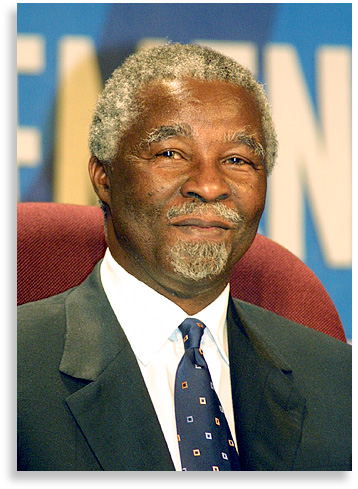Mbeki agrees to resign as president after push by ANC
 Johannesburg - South Africa was thrown into turmoil Saturday after President Thabo Mbeki caved into pressure from the governing African National Congress (ANC) to resign his office.
Johannesburg - South Africa was thrown into turmoil Saturday after President Thabo Mbeki caved into pressure from the governing African National Congress (ANC) to resign his office.
The ANC said earlier it was recalling Mbeki as president in a bid to heal divisions in the party following a court finding of political interference in the corruption case of Mbeki's rival, ANC leader Jacob Zuma.
Mbeki's spokesman Mukoni Ratshitanga confirmed Mbeki would go without a fight saying in a statement: "The President has obliged and will step down after all constitutional requirements have been met."
Mbeki, who is in the final months of his second five-year term, had yet to address the nation on the matter. He will remain president until an acting president has been named.
Zuma, 66, is the ANC's candidate to lead the party into elections slated for April next year, but Zuma is not a member of parliament, making it unlikely he will take over in the immediate term.
The National Executive Committee made the announcement of Mbeki's recall after lengthy talks behind closed doors on the president's fate, coming just five days after Mbeki was the toast of the world for brokering a power-sharing deal in Zimbabwe.
Mbeki's neck has been on the ANC's chopping block since September 12, when a High Court judge setting aside corruption charges against Zuma, inferred Mbeki had interfered with the judicial process.
Zuma was charged with corruption in December 2007 over payments he received from a convicted fraudster relating partially to a state arms deal. Just days earlier Zuma had been defeated by Mbeki in an ANC leadership vote. The charges against Zuma were set aside.
Normally, when the presidency is vacated, the deputy president takes over, but Mbeki's deputy Phumzile Mlambo-Ngcuka has said she will quit if Mbeki resigns.
In that case the acting president is either a minister chosen by Mbeki, a minister chosen by cabinet or the speaker of parliament, Baleka Mbete, in that order.
ANC Secretary-General Gwede Mantashe said the decision was in the interest of the "stability of our country and of our movement" - a claim rebuffed by opposition parties, which accused the party of plunging the country into uncertainty to settle old scores.
"This is a wholesale purge. It is revenge, pure and simple," Helen Zille, leader of the main opposition Democratic Alliance, said.
"It has everything to do with the internal battles of the ANC and nothing to do with the interest of South Africa."
Mbeki and Zuma have been foes ever since Mbeki sacked Zuma as his deputy in 2005 on suspicion of corruption in an arms deal.
Zuma came back to oust Mbeki as party leader, leaving Mbeki a lame-duck president.
Last week's court ruling was seen by Zuma's allies as a vindication of their long-held claim that he was being "persecuted, not prosecuted" by the state.
Analysts say the showdown between Mbeki and Zuma could cost the party votes at the election. The party is expected to easily win the election but its more-than-two-thirds majority could be dented.
Aware of that danger, Zuma had resisted calls by the militant ANC Youth League for Mbeki to be shown the door, saying at the weekend there was no point in "beating a dead snake."
The party also appealed to Mbeki's cabinet allies to stay on to assure the transition. In a reassuring sign for foreign investors, popular Finance Minister Trevor Manuel said through a spokesman he would remain.
In handing him his marching papers, the ANC chose not to dwell on the more controversial elements of his legacy, instead paying tribute to Mbeki's strong management of the economy. South Africa has posted growth averaging 5 per cent over the past four years.
"President Mbeki has overseen the longest economic growth period in recent times" in South Africa, Mantashe noted. (dpa)